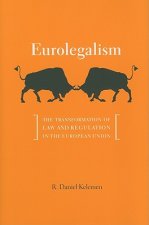
Kod: 04532962
Delegating Rights Protection
Autor David Erdos
Delegating Rights Protection explores bill-of-rights outcomes in four "Westminster" countries - Australia, Canada, New Zealand, and the United Kingdom - whose development exhibit an interesting combination of both commonality and ... więcej
- Język:
 Angielski
Angielski - Oprawa: Twarda
- Liczba stron: 270
Wydawca: Oxford University Press, 2010
- Więcej informacji o książce

Zobacz książki o podobnej tematyce
-

Eurolegalism
374.34 zł
Podaruj tę książkę jeszcze dziś
- Zamów książkę i wybierz "Wyślij jako prezent".
- Natychmiast wyślemy Ci bon podarunkowy, który możesz przekazać adresatowi prezentu.
- Książka zostanie wysłana do adresata, a Ty o nic nie musisz się martwić.
Więcej informacji o Delegating Rights Protection
Za ten zakup dostaniesz 480 punkty
 Opis
Opis
Delegating Rights Protection explores bill-of-rights outcomes in four "Westminster" countries - Australia, Canada, New Zealand, and the United Kingdom - whose development exhibit an interesting combination of both commonality and difference. Comparative analysis of some thirty-six democracies demonstrates that the historic absence of a bill of rights in Westminster countries is best explained by, firstly, the absence of a clear political transition and, secondly, their strong British constitutional heritage. Detailed chapters then explore recent and much more diversified developments. In all the countries, postmaterialist socio-economic change has resulted in a growing emphasis on legal formalization, codified civil liberties, and social equality. Pressure for a bill of rights has therefore increased. Nevertheless, by enhancing judicial power, bills of rights conflict with the prima facie positional interests of the political elite. Given this, change in this area has also required a political trigger which provides an immediate rationale for change. Alongside social forces, the nature of this trigger determines the strength and substance of the bill of rights enacted. The statutory Canadian Bill of Rights Act (1960), New Zealand Bill of Rights Act (1990), and the Human Rights Act (UK) (1998) were prompted politically by a relatively weak and backward-looking 'aversive' reaction against perceived abuses of power under the previous administration. Meanwhile, the fully constitutional Canadian Charter (1982) had its political origins in a stronger, more self-interested and prospective need to find a new unifying institution to counter the destabilizing, centripetal power of the Quebecois nationalist movement. Finally, the absence of any relevant political trigger explains the failure of national bill of rights initiatives in Australia. The conclusionary section of the book argues that this Postmaterialist Trigger Thesis (PTT) explanation of change can also explain the origins of bills of rights in other internally stable, advanced democracies, notably the Israeli Basic Laws on human rights (1992).
 Szczegóły książki
Szczegóły książki
Kategoria Książki po angielsku Law Laws of Specific jurisdictions Constitutional & administrative law
823.91 zł
- Pełny tytuł: Delegating Rights Protection
- Podtytuł: The Rise of Bills of Rights in the Westminster World
- Autor: David Erdos
- Język:
 Angielski
Angielski - Oprawa: Twarda
- Liczba stron: 270
- EAN: 9780199557769
- ISBN: 0199557764
- ID: 04532962
- Wydawca: Oxford University Press
- Waga: 578 g
- Wymiary: 241 × 162 × 24 mm
- Data wydania: 05. August 2010
Ulubione w innej kategorii
-

Equal Rights Handbook
51.64 zł -5 % -

Matter of Interpretation
81.35 zł -4 % -

Constitution of the United States of America with the Declaration of Independence
61.11 zł -23 % -

Human Rights, Ownership, and the Individual
497.38 zł -

America's Unwritten Constitution
107.62 zł -11 % -

Age of Dignity
609.44 zł -

Federalist Papers
38.25 zł -14 % -

Federalist Papers
74.10 zł -10 % -

Art of the Advocate
70.37 zł -23 % -

Law of Public and Utilities Procurement Volume 2
1616.01 zł -

EU Constitutional Law
172.06 zł -5 % -

Cyberwar
109.34 zł -5 % -

Federalism: A Very Short Introduction
55.57 zł -5 % -

Anti-Federalist Papers and the Constitutional Convention Debates
37.55 zł -4 % -

European Convention on Human Rights
2199.38 zł -

Gabby Petito's Story
47.01 zł -23 % -

Proportionality
322.89 zł -

Magna Carta
61.11 zł -23 % -

Theory of Interpretation of the European Convention on Human Rights
323.60 zł -

Framers' Coup
113.56 zł -5 % -

Application of the Principle of Subsidiarity in Eu Law
253.12 zł -

Power of Persuasion
171.56 zł -

Privacy: A Very Short Introduction
42.68 zł -23 % -

Commentaries on the Constitution of the United States Vol. III (in three volumes)
152.23 zł -

Civil Liberties & Human Rights
281.01 zł -

Staats- und Verwaltungsrecht Nordrhein-Westfalen
103.29 zł -

Gunfight
81.44 zł -5 % -

Rewriting Children's Rights Judgments
746.38 zł -

Beginning Constitutional Law
216.87 zł -

Raised Right
144.47 zł -

Constitutional and Administrative Law
225.43 zł -

Legitimate Expectations and Proportionality in Administrative Law
746.38 zł -

Theory and Practice of the European Convention on Human Rights
1046.83 zł -

Corporate Counsel Survival Guide
335.28 zł -

ISO 37001
89 zł -

Data Privacy Law
982.19 zł -

Fundamental Rights and Principles
652.84 zł -

Enterprise of Law
104.50 zł -7 % -

Anatomy of Human Rights in Israel
491.54 zł -

Constitution of the United States of America and the Constitution of the Confederate States of America
49.63 zł -

National and Regional Parliaments in the EU-Legislative Procedure Post-Lisbon
746.38 zł -

Rule of Law in the European Union
609.65 zł -

Federalist
70.47 zł -

Legislation in Europe
930.84 zł -

Constitutionalism and the Role of Parliaments
664.02 zł -

Emerging Constitutional Law of the European Union
285.64 zł -

European Convention on Human Rights
269.53 zł -

Nature of Legislative Intent
527.79 zł -

Law and Administration
504.63 zł
zadowolonych klientów
Od roku 2008 obsłużyliśmy wielu miłośników książek, ale dla nas każdy był tym wyjątkowym.
Copyright! ©2008-24 libristo.pl Wszelkie prawa zastrzeżonePrywatnieCookies



 21 milionów książek
21 milionów książek Dostawa 10.99 zł
Dostawa 10.99 zł (32) 444 93 66 (8-15.30h)
(32) 444 93 66 (8-15.30h)